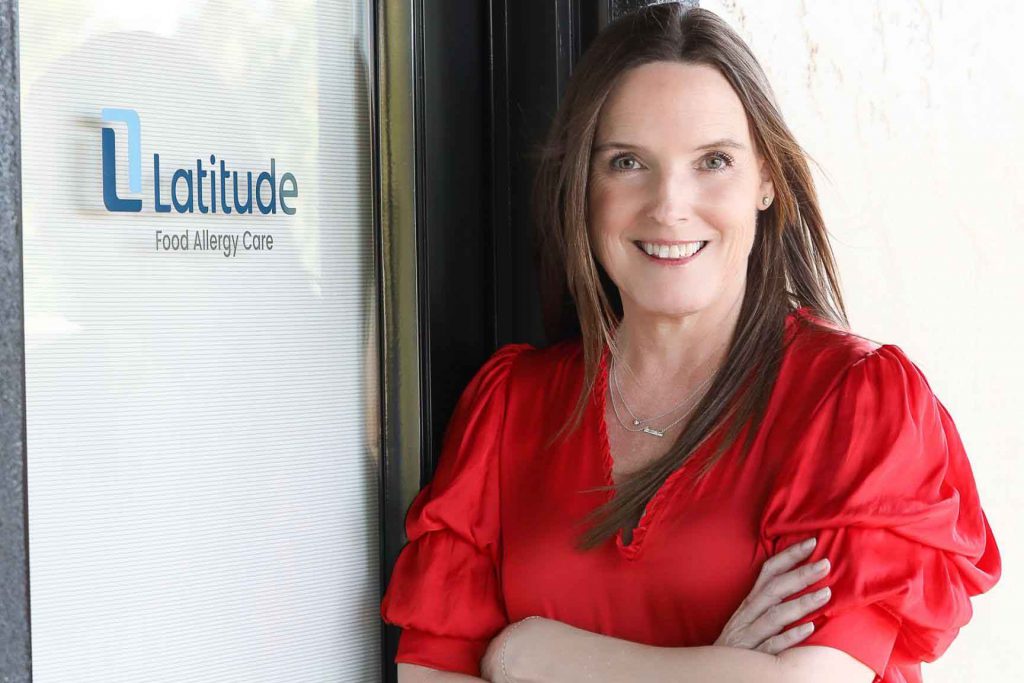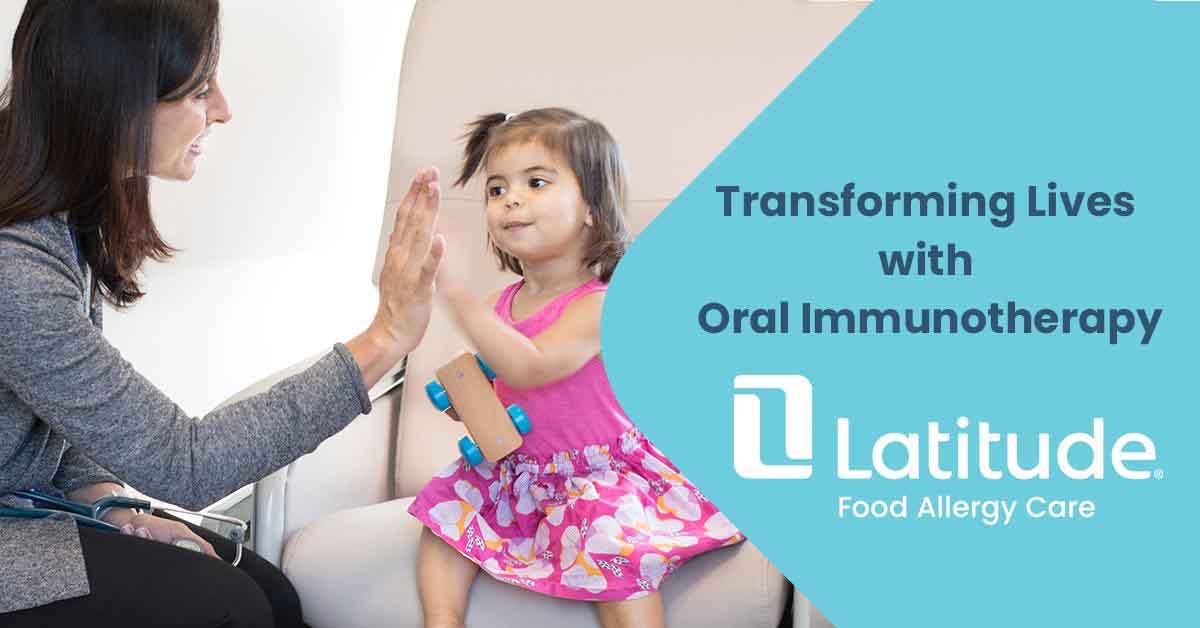An interview with Kimberley Yates, Founder and CEO, Latitude Food Allergy Care
You’ve read about the studies here for years and maybe even had a brief conversation with your allergist. Perhaps you assumed treatment with oral immunotherapy (OIT) wasn’t an option for your family. But over the last decade, tens of thousands of lives have been improved with OIT. Latitude Food Allergy Care is leading the charge to help families get clear answers and life-changing treatment.
Latitude is the first national network of clinics 100% focused on food allergy. Founded five years ago by food allergy parents and led by board-certified allergists, Latitude provides testing and treatment including OIT for patients of all ages.
SnackSafely recently sat down with Kimberley Yates, Latitude Founder and CEO to discuss OIT and Latitude’s unique model of care.

Dave from SnackSafely: Thank you for taking the time to sit with us, Kim. Can you tell us a bit about your background and why you started Latitude?
Kimberley Yates: Thank you! I’m really grateful to have the opportunity to help more food allergy families learn about their options for care. Over the past decade, I’ve worn many different hats in the food allergy community — parent, advocate, volunteer leader for FARE, and founding team member of the Sean N. Parker Center for Allergy and Asthma Research at Stanford. During this time I’ve met countless families who were confused by outdated and often conflicting advice from their doctors. We built Latitude to provide easy access to testing and care, so all food allergy families could get clear answers and proactive, evidence-based treatment in a warm, welcoming, and supportive environment.
What do you think is the most confusing advice that families hear?
“Avoidance is the only answer.” It’s frustrating that people are still hearing this today.
My daughter Tessa had multiple life-threatening food allergies, and by the time she was nine years old, she already had four near-death experiences. I was at the end of my rope seeking answers for her safety. ‘Avoidance’ was not working. When I met Dr. Kari Nadeau at Stanford, I finally received a glimmer of hope when she introduced the idea of OIT, a treatment that could simultaneously treat all of Tessa’s food allergies. Tessa became the first participant in Stanford’s groundbreaking clinical trial treating multiple allergens with OIT. Today OIT is a real option for patients of all ages. At Latitude, we start treatment as young as 12 months, and it can be beneficial for adult patients too.
We’ve heard treatment can be logistically rigid and challenging for families. What is your experience?
There is definitely a perception that OIT means rigid rules, high out-of-pocket costs, frequent and inconvenient appointments, age restrictions, and years of treatment before you’ll see results. But that’s not the case at Latitude. Our protocols prioritize safety and definitely include guidelines — it is a serious medical treatment, after all — but it also has to fit into a family’s lifestyle to make it sustainable. Our food allergy specialists work closely with families to ensure the benefits outweigh the burden of treatment. We start by doing thorough testing, using gold-standard diagnostics so that we only treat for the foods the patient is actually allergic to. Active treatment is generally less than a year, and we’ve seen a 92% success rate with our OIT patients. Also, we are in-network with many different insurance providers and are working hard to make sure that food allergy care is financially accessible.
What is your approach to treatment at Latitude?
As I mentioned, we first start with a thorough testing process to determine what a patient is truly allergic to. After helping thousands of people, we have found that patients often do not know what they are really allergic to. For instance, some families think they are allergic to “all nuts” but in reality, they may only be allergic to one or two specific nuts. So we’ll do testing which often includes multiple oral food challenges (OFC) to clarify the list of actual allergies.
We’ve designed our practice to be able to safely offer many food challenges, which is particularly important as so many people have not had access to this gold standard test in the past. And I’m especially encouraged by the fact that we have an 80% pass rate for OFCs — that means that we are putting foods back into our patient’s diets that they have been unnecessarily avoiding based on unclear or outdated information. Allergies can change over time, making it so important for patients to seek an updated diagnosis. Once we have answers from the testing we are able to put together a personalized plan for treatment.
What if a patient is allergic to many different allergens or has a history of anaphylaxis? Could they still be a candidate for OIT at Latitude?
Yes! We are able to safely treat the most severe allergies. Patients and their families — like mine — who have a long list of foods to avoid or have had the unfortunate experience of severe reactions actually benefit the most from treatment! If a patient has a long list of allergens we work hard to first reduce that list with food challenges before starting treatment. And for those with the most severe allergies, we can raise their threshold of reaction through the OIT process, we can reduce ER visits, EpiPen usage, and very importantly, the emotional toll on the patient and their family.

Why do you think more people haven’t undergone OIT treatment? What would you tell someone considering it?
Awareness and access. OIT is a relatively new treatment and, unfortunately, I think awareness of it is still fairly low and access is fairly limited. There is a lot of misinformation and there are many misconceptions. Families are unaware that treatment is not only available but is absolutely manageable. Thousands of people have gone through treatment with OIT with life-altering results.
Latitude is 100% focused on food allergy care and we have been able to make great strides, but we’re still getting the word out to the community and doing what we can to expand across the country to ensure all families have access.
Personally, I can say that my daughter Tessa’s treatment was life-changing for our entire family. We are all less anxious and Tessa has gained total independence. She has literally been able to travel the world on her own without worrying about her food allergies. And beyond my family, I’ve personally seen OIT empower hundreds of families by reducing the risk of accidental ingestion, and reducing the anxiety that comes with food allergies. They’ve been able to go to restaurants, open up social and travel plans, school and camp opportunities, and eat foods that they love. To me, it is short-term “pain” for massive long-term gain. It’s worth it just to live your life more freely and — yes, I’m going to say it — with latitude!
Thanks so much for your time, Kim. I wish you much continued success in helping transform lives with the practice you’ve built at Latitude!
To learn more about Latitude and treatment options that might be right for your family, contact them today. Their patient care specialists are available to provide more information, and they can also connect you with Latitude parents and patients who have gone through treatment and can share their personal experiences.





